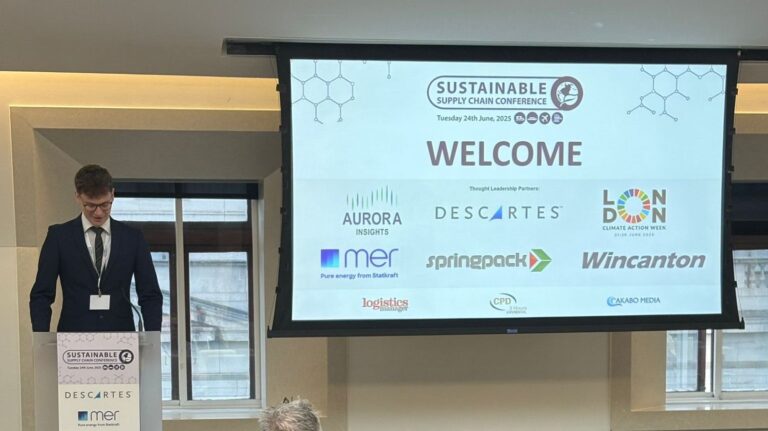On 24 June 2025, leaders in sustainability, supply chain and logistics came together at 30 Euston Square in London for the Sustainable Supply Chain Conference 2025.
This annual event, where bold ideas meet real-world action, brought supply chain leaders, experts and decision-makers together to take part in discussions surrounding the future of sustainability in supply chains, highlighting challenges and discussing different solutions.
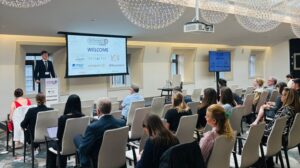
The goal of the conference each year is not simply to share ideas, but to build momentum and inspire change. And through it’s comprehensive agenda with sessions led by expert speakers – and ample opportunity for delegates to network and continue the discussions – this is exactly what was achieved at this year’s event.
Logistics Manager is proud to present some of the highlights and key takeaways from the 2025 edition of the Sustainable Supply Chain Conference.
But before that, Logistics Manager would like to thank the thought leadership partners of this year’s conference: Aurora Insights, Descartes, Mer Fleet Services, Springpack and Wincanton.
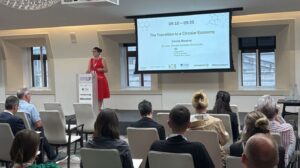
The day began with a keynote presentation from Emma Bourne OBE, director of circular economy at the Department for Environment, Food and Rural Affairs. In her session, Bourne explained that the UK government has committed to transitioning to a circular economy, and has established a Circular Economy Taskforce with the aim of developing a Circular Economy Strategy for England. More details of this strategy are expected in the autumn of this year.
Bourne also emphasised the driving force behind this strategy, highlighting some shocking statistics in terms of waste, particularly in the food and textile industries – as well as the overwhelming feeling of support from the public for reusable products instead of single-use goods, which she believes will be key to achieving a circular economy.
“We’re at an inflection point in our economy and our environment.”
– Emma Bourne OBE
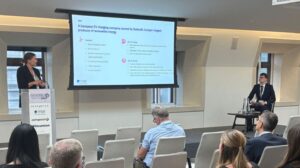
The second session of the day was delivered by Natasha Fry, head of sales at Mer UK. This focused on strategic planning for depot electrification, highlighting how companies can create a long-term, cost effective and scalable fleet electrification strategy, and why smart design and robust aftercare are essential to future-proofing EV charging infrastructure and achieving success in the long term.
Fry also shared examples from a case study with IKEA of how the brand overcame complexities and challenges to electrify its sites for emission-free deliveries.
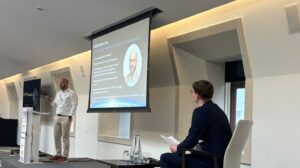
Delegates then heard from Gary Rosier-Taylor, vice president of sales at Descartes. He emphasised the value of today’s technologies, including AI and machine learning, to optimise fleet operations in ways such as reducing mileage and maximising delivery density.
Rosier-Taylor also went into detail about the numerous business benefits that come with achieving more sustainable fleet operations, and shared a shocking statistic that 80% of companies don’t track their On Time In Full (OTIF) rates.
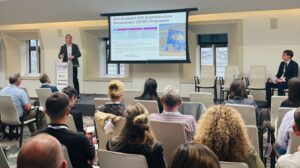
After a short break, Jesse Prendergast, knowledge transfer manager at Innovate UK Business Connect, took to the stage to outline Innovate UK’s work in the transport and logistics sector.
Prendergast took the audience through the Zero Emission HGV & Infrastructure Demonstrator (ZEHID) Programme, and how it is delivering vehicles, ancillary equipment and infrastructure to support the UK government’s net zero ambitions and its commitment to end the sale of new, non-zero emission HGVs by 2035 (26 tonnes and under) and 2040 (all HGVs).
He touched on plans to create 54 new infrastructure hubs around the UK, including the installation of hydrogen refuelling infrastructure.
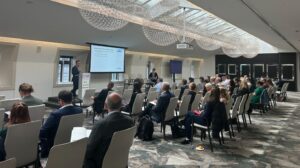
Next up to speak was Paul Chandler, deputy director for net zero travel and transport at NHS England. He explained how the NHS is playing a leading role in decarbonising road freight transport across England.
Chandler’s session covered: the NHS Net Zero Travel and Transport (NZTT) Strategy; the UK Zero Emission Vehicle (ZEV) Mandate; and progress made so far in electrifying the NHS’ vehicle fleet.
He went into detail about NHS projects to electrify emergency ambulances, and a trial which saw the deployment of 20 battery electric trucks in public sector fleets across England between April 2022 and September 2023.
“All new ambulances will need to be electric by 2030, if not sooner.”
– Paul Chandler
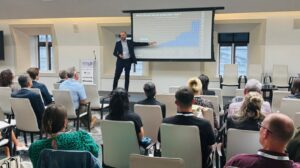 Then Chris Low, head of procurement sustainability and packaging at Haleon, spoke about how firms can drive decarbonise supply chains as a whole – not just their logistics operations – to maximise collective impact.
Then Chris Low, head of procurement sustainability and packaging at Haleon, spoke about how firms can drive decarbonise supply chains as a whole – not just their logistics operations – to maximise collective impact.
Low shared how Haleon has adopted carbon pricing, a mechanism that puts a cost on carbon emissions to incentivise suppliers and partners to reduce their greenhouse gas emissions, in its tenders. He explained how this is helping drive progress towards Haleon’s goal of to reducing its Scope 3 footprint (source to sale) by 42% by 2030.
He also highlighted the critical role renewable energy can play in decarbonisation efforts, and shared how this fits into Haleon’s decarbonisation plan to supports its 2030 ambitions.
“The more companies that leverage carbon pricing methodology, the stronger the return on investment for suppliers.”
– Chris Low
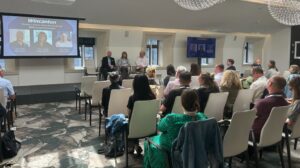
And the final morning session saw transport and logistics communications expert and former Logistics Manager editor Chris Walton moderate a fireside chat with two prominent figures at Wincanton. Walton was joined on stage by Helen Flanagan, Wincanton’s product director for EyeQ, and Sean Clifton, Wincanton’s fleet director.
This session covered everything from Wincanton’s electric vehicle rollout and its use of alternative fuels with customers such as Screwfix and IKEA, to collaborations with Innovate UK and Electric Freightway on zero-emission freight corridors.
As well as vehicles and infrastructure, the discussion also touched on the importance of digital technologies in reducing emissions, as well as optimising routes and loads.
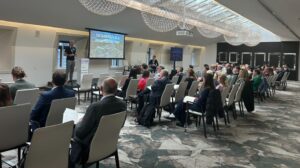
Then after lunch, Daniel Walton, founder and managing director at OLPRO, talked delegates through the camping equipment company’s many sustainability initiatives, all built around three key pillars: REPRO, RETRIBE and PRE-LOVED.
OLPRO REPRO is a re-purposed material which is available across its full range from 2024 onwards. It utilises plastic waste, helping to remove single use plastic bottles from the UK’s waterways. Its RETRIBE initiative began in 2021, and encompasses efforts to plant trees all over the world, working alongside Ecologi, in areas which need them most. OLPRO has pledged to plant a tree for every tent, awning and backpack sold.
And finally, its PRE-LOVED initiative ensures all returned goods are repaired and re-sold. Walton noted that in 2023 and 2024, OLPRO was able to save and re-sell 232 tents and campervan awnings.
He was also keen to point out ways in which companies like OLPRO can take advantage of consumer demand for sustainable products and business practises to drive sales, all while benefitting the environment.
“Sustainability in e-commerce is no longer optional – it’s a competitive advantage.”
– Daniel Walton

After this presentation, attention turned to a panel discussion. Moderated by Logistics Manager’s editor, James McLoughlin, the focus of this discussion was sustainability certifications and what it means to be a B Corp. To offer insights into this topic, the panel comprised of Alex Florea, head of sustainability at cult British skincare manufacturer and B Corp Medik8, and Ashleigh Horn, responsible sourcing and sustainability manager at Cook Trading – a family-owned, founding UK B Corp, which specialises in hand-prepared frozen meals.
Throughout the course of this discussion, both experts spoke about the similarities and differences in their experiences with B Corp certification and recertification, in two very different sectors.
Both acknowledged the challenges associated with changes to the way in which firms are assessed to become or maintain B Corp status, but spoke positively of the rigorous process and the benefits of being a B Corp. They shared with the audience some innovate ways in which they are working to engage their entire businesses – not just the sustainability teams – with their sustainability strategies, as well as difficulties and solutions for ensuring suppliers align with company values and communicating the meaning of B Corp to consumers.
“Don’t let perfectionism get in the way of progress.”
– Ashleigh Horn
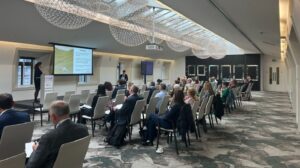
The penultimate session of the day was all about ESG reporting and how it can drive accountability and transparency in supply chains. Leading this presentation was Shelley Franklin-Morris, senior sustainability manager at Bidfood UK. She highlighted the central role data will play in the future of sustainable supply chains, and the importance of gathering data not just for compliance, but using it to drive measurable progress.
Franklin-Morris walked delegates through all the data that Bidfood reports, and encouraged companies to look beyond mandatory reporting and realise the value of reporting in driving a business’ progress.
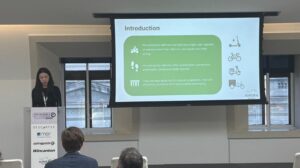
Finally, rounding off the agenda for the Sustainable Supply Chain Conference 2025, Xinchen Li, research analyst at Aurora Insights, shared some exclusive findings from Aurora Insight’s upcoming report looking into micromobility trends.
The session examined major trends in the growth of micromobility, addressing significant implementation challenges, technological advancements and its broader impact on transportation and logistics.
She noted that micromobility is rapidly expanding in transportation and logistics due to increased sustainability awareness, public health concerns and its potential to improve business profitability and user satisfaction, and claimed that by providing an alternative to high-emission vehicles, micromobility supports sustainability, reduces congestion, improves efficiency and enhances accessibility and equity in urban areas.
With that, and after some closing remarks from the conference’s chair, the Sustainable Supply Chain Conference 2025 came to an end. The conference will return to London in 2026, and everyone will be keen to find out how different companies have fared in their sustainability journeys over the year between now and then, as well as discussing the challenges and trends that will inevitably arise during this time.
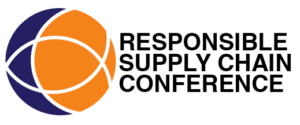 Before then though, Aurora Insights is hosting the inaugural Responsible Supply Chain Conference in Berlin this year, taking place on 18-19 November 2025.
Before then though, Aurora Insights is hosting the inaugural Responsible Supply Chain Conference in Berlin this year, taking place on 18-19 November 2025.
The conference will focus on evolving EU policy landscapes, innovation, extended producer responsibility, and green technologies – including the integration of AI and automation, alongside the CRSDD, circular economy and eco design action plans.
For more information, and to register your interest for this exciting event, click here!


